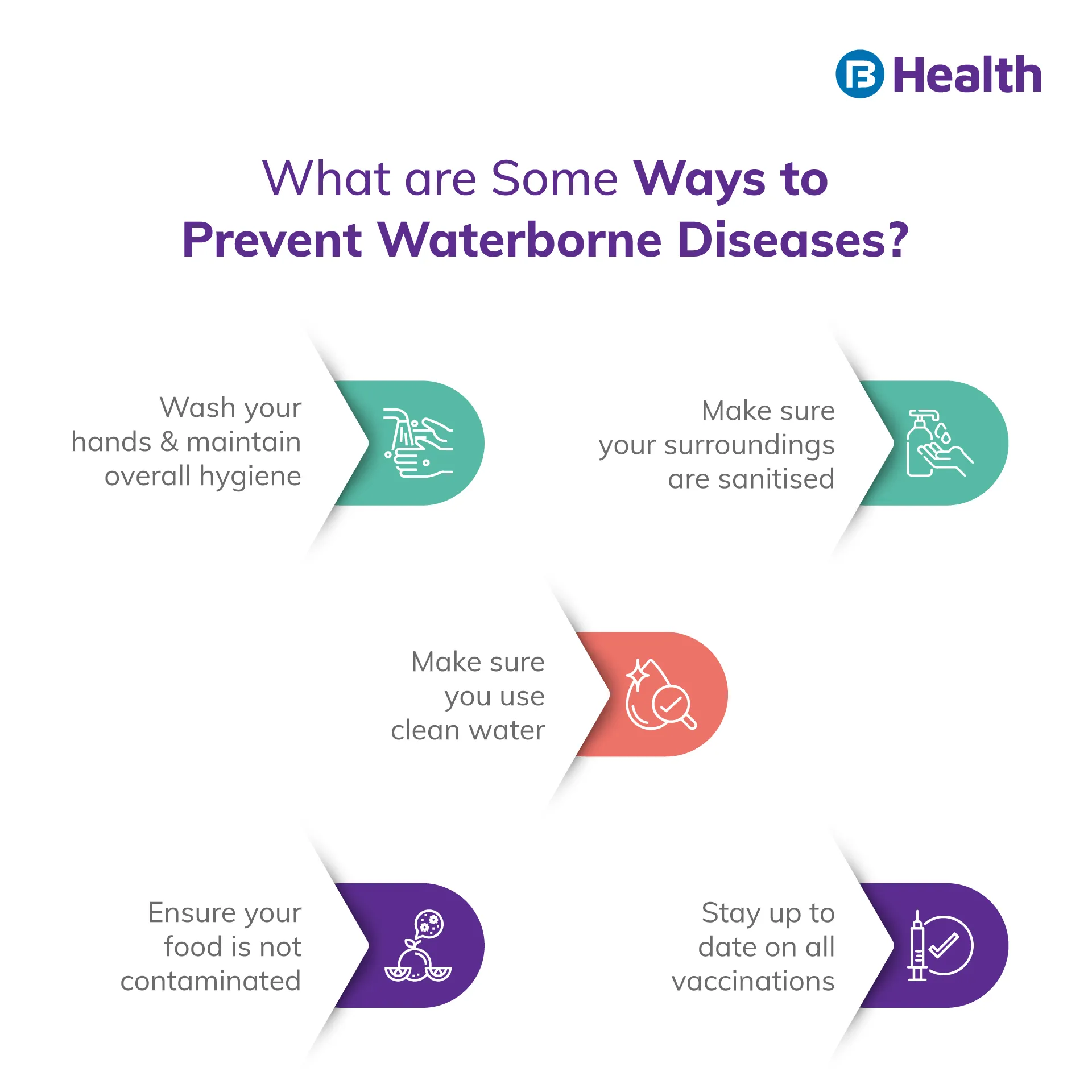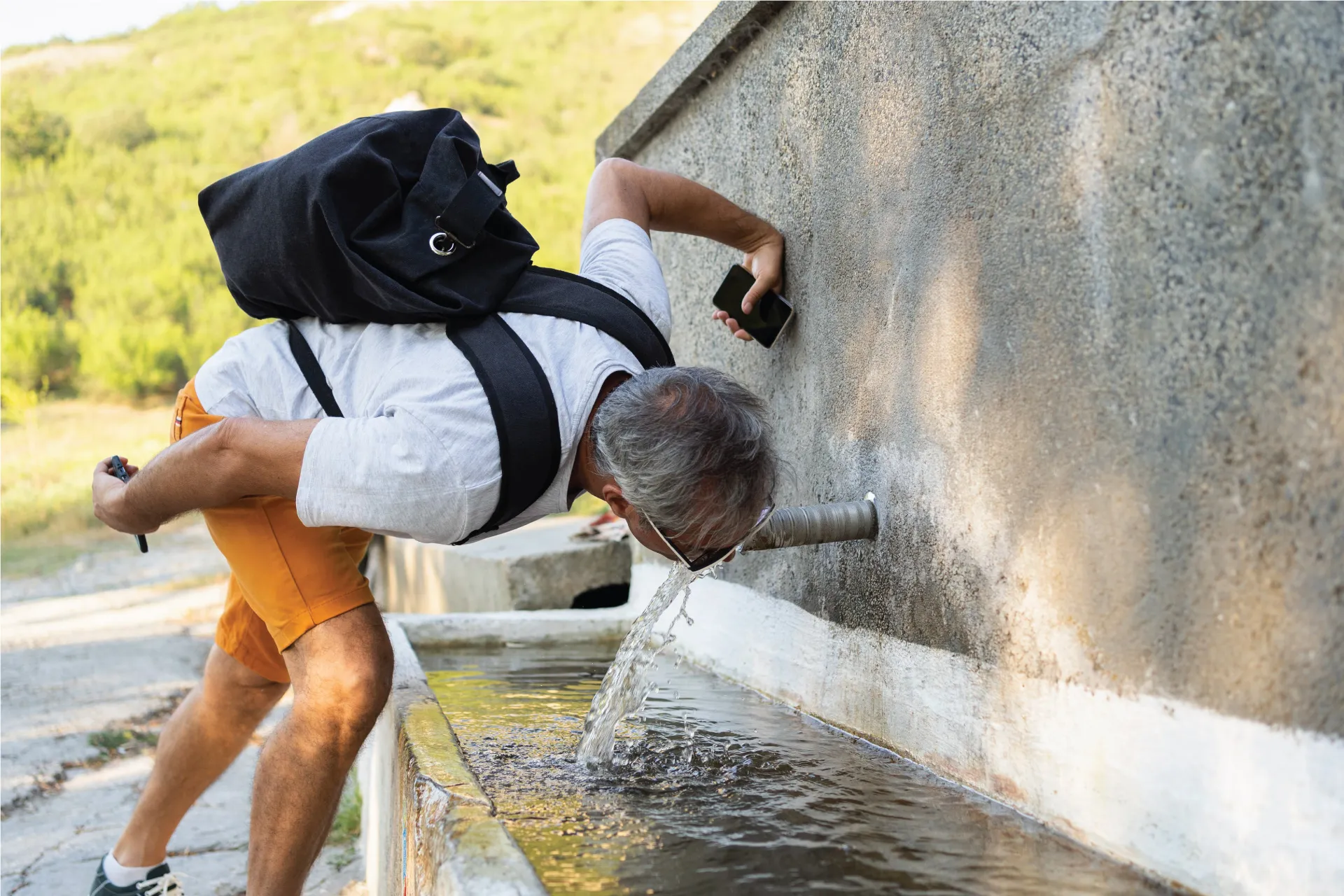General Health | 5 min read
Most Common Waterborne Diseases: Symptoms and Prevention
Medically reviewed by
Table of Content
Synopsis
Every year, waterborne diseases affect hundreds and millions of people, especially those in underdeveloped nations who lack access to safe drinking water. These illnesses can be passed on through bathing, washing, drinking polluted water, or consuming food. In this article, we'll discover the most common waterborne diseases and how to prevent them.
Key Takeaways
- WASH (water, sanitation, and hygiene) is necessary to prevent nearly all waterborne diseases
- ractical and affordable methods can integrate into existing surveillance for water quality and safety
- Access to clean water impacts every aspect of life, including health and hygiene
What are Waterborne Diseases?
The term refers to ailments brought on by microscopic organisms, such as viruses and bacteria, that get consumed through tainted water or by coming in contact with faeces. Waterborne diseases would not exist if everyone had access to clean water, adequate sanitation, and good hygiene practices.
In the past 20 years, governments, NGOs, and local communities have achieved significant progress in the fight against waterborne diseases. There is still much work to be done. Clean water and proper sanitation can help with the prevention of waterborne diseases.
Diarrhoea is one of the primary symptoms of waterborne diseases of the seven water-caused illnesses that are most prevalent worldwide. According to the most recent data, diarrhoea kills more children than malaria, AIDS, and measles combined. [1] It is the second largest cause of mortality for children under five years old. [2]
Common Waterborne Diseases List
Below are examples of waterborne diseases, symptoms, prevention and treatment.
1. Typhoid Fever
Typhoid fever, uncommon in affluent nations, is well-known in underdeveloped regions of developing countries; nearly 20 million humans globally contract the illness each year. It is highly contagious and spreads through tainted food, unclean water, and sub-par hygiene.
Symptoms
- A steadily increasing fever
- Muscle pain
- Fatigue
- Sweating
- Constipation or diarrhoea
Treatment and Prevention
Vaccinations are advisable for those travelling to places where contaminated water and inadequate sanitation are frequent. The vaccination can be administered orally for days or as an injection. Avoid consuming food from villagers or street sellers, and refrain from drinking any unbottled, sealed water. Antibiotics help treat typhoid.
Additional read: World Immunization Week
2. Cholera
Cholera is frequently seen in remote areas or in humanitarian crises when deprivation and poor sanitation are pervasive. The illness that causes severe diarrhoea and dehydration gets spread via contaminated water. Only one in ten people may experience life-threatening symptoms with cholera, but it can be lethal within days or even hours of its infection.
Symptoms
- Nausea
- Vomiting
- Diarrhea
- Muscle cramping
Treatment and Prevention
When travelling, cholera is a waterborne disease that can be easily avoided. Wash your hands frequently, avoid eating raw fish (no sushi), and only consume fruits and vegetables that you can peel yourself, such as avocados, bananas, and oranges.
Drink plenty of clean water
Additional read: Food Poisoning3. Giardia
The most common places for this waterborne disease to be discovered are ponds, streams, swimming pools, water supplies, and pits containing stalled water. A parasite is to blame for the infection, which usually goes away after a few weeks.
Symptoms
- Abdominal pain
- Cramps
- Bloating
- Diarrhoea
- Nausea
- Weight loss
Treatment and Prevention
Giardia does not have a vaccine, but there are easy measures to prevent the illness. For example, avoid swallowing water when swimming, wash your hands frequently, and only consume bottled water.
Giardia is defeated over time by the immune system on its own. However, if symptoms get worse, doctors would recommend antibiotics and anti-parasite drugs.
Additional read: Save Lives Clean Your Hands4. Dysentery
Dysentery is a waterborne disease caused by an intestinal infection marked by extreme diarrhoea and blood or mucus in the stool. Because poor hygiene is a prime factor in the transmission of the disease, dysentery is a valid reason to wash your hands regularly. It may strike your body through contaminated food, drink, faeces, bacteria, viruses, or parasites. Dysentery patients' lives may be in danger if they cannot quickly replace lost fluids.
Symptoms
- Constipation and pain in the stomach
- Diarrhoea
- Fever
- Nausea
- Vomiting
- Dehydration
Treatment and Prevention
Wash your hands with soap frequently, ask for no ice in your drinks, avoid eating food from street vendors, and only consume fruits that you can peel to prevent dysentery.
When you visit regions with a higher risk of dysentery, such as countries where basic hygiene standards are uncommon, then only drink sealed, bottled water.
5. Hepatitis A
Hepatitis A is a liver disease caused by an infection brought on by ingesting contaminated food or water or being close to an infected person. The disease affects people who frequently travel to underdeveloped nations or work in rural areas with sub-par sanitation and hygiene practices.
Symptoms
- Fatigue
- Clay-coloured stools
- Jaundice
- Nauseousness
- Vomiting
- Abdominal pain
- Loss of appetite
- Fever
Although the illness typically resolves in a few weeks, it can worsen and last several months.
Treatment and Prevention
- Getting the vaccine is the most effective method of preventing hepatitis A
- Eat nothing at room temperature and only items that have been fully cooked and served hot
- Only eat fruit that you can peel and that you have peeled yourself
- Do not eat from food vendors and runny eggs or raw/rare meat

6. Salmonella
Symptoms
- Chills
- Blood in the stool
- Headache
- Diarrhoea
Treatment and Prevention
Be careful to cook your food and store or freeze it within 30 minutes after use to avoid contracting waterborne diseases. Always wash your hands frequently, and refrain from touching birds or reptiles.
A salmonella infection makes the body dehydrated. Drink fluids and electrolytes to treat it. Hospitalisation and antibiotics may get needed in some cases.
7. Leptospirosis
Leptospirosis-causing bacteria gets transmitted by sick animals' urine, which can enter water or soil and persist for several weeks to months. The bacterium gets carried by many different species of wild and domesticated animals.Symptoms
- High fever
- Headache
- Chills
- Muscle aches
- Nausea
- Vomiting
- Jaundice
- Red eyes
- Backache
- Diarrhoea
- Rash
Treatment and Prevention
Avoiding contact with potentially infected animals and avoiding swimming or wading in contaminated water with animal urine can significantly lower the chance of contracting leptospirosis.
Those vulnerable to toxic water or soil due to their jobs or recreational activities should wear protective apparel or footwear.
All types of waterborne diseases can have adverse consequences on the body and might also impair your immunity and intestines, making it incredibly challenging to keep them operating normally. According to your doctor's recommendations, it is imperative to get all required vaccinations to live a healthy life. You can get protection against diagnostic tests, doctor's fees, prescriptions, hospitalisation, and other costs with Bajaj Finserv Health. You can also get an online doctor consultation from the comfort of your home and discuss any query you have with a professional.
References
- https://www.who.int/news-room/fact-sheets/detail/diarrhoeal-disease
- https://www.cdc.gov/healthywater/pdf/global/programs/globaldiarrhea508c.pdf
Disclaimer
Please note that this article is solely meant for informational purposes and Bajaj Finserv Health Limited (“BFHL”) does not shoulder any responsibility of the views/advice/information expressed/given by the writer/reviewer/originator. This article should not be considered as a substitute for any medical advice, diagnosis or treatment. Always consult with your trusted physician/qualified healthcare professional to evaluate your medical condition. The above article has been reviewed by a qualified doctor and BFHL is not responsible for any damages for any information or services provided by any third party.





